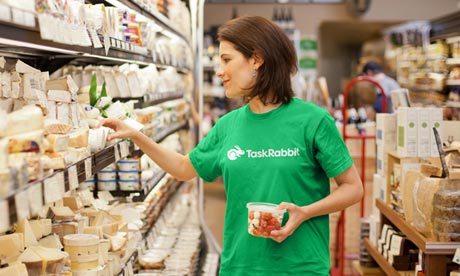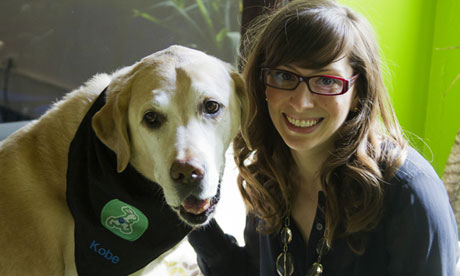The sharing economy: a whole new way of living

 Martín Varsavsky, CEO and founder of FON. Photograph: Sean Gallup/Getty Images
Martín Varsavsky, CEO and founder of FON. Photograph: Sean Gallup/Getty Images
 Leah Busque and Kobe, the dog that inspired her to found TaskRabbit. Photograph: TaskRabbit
Leah Busque and Kobe, the dog that inspired her to found TaskRabbit. Photograph: TaskRabbit
 Nicolas Brusson, co-founder of BlaBlaCar.com Photograph: Blablacar.com
Nicolas Brusson, co-founder of BlaBlaCar.com Photograph: Blablacar.com

TaskRabbit is a peer-to-peer marketplace for neighbourhood errands, such as shopping for groceries.
In 2006, serial entrepreneur and investor Martín Varsavsky – inspired by a conviction that he could cloak the world in free Wi-Fi by encouraging people to share their home connections – founded Fon in Madrid. The company is now the largest Wi-Fi network in the world, with almost 12m hot spots in more than 100 countries.
"My general thinking at the time was that we live in a world in which benefits are only accrued through economic growth and the endless consumption of resources, and that there have to be other ways that are of more benefit to people," he says. "Why should everyone have their own car when most of the time they are not using them? Think of a marina full of boats. How frequently do those boats go out?"
Today, it has been argued that the sharing economy – which is perhaps best defined as a way of sweating underutilised assets, by building communities around them and turning consumers into providers – has the potential to reboot businesses across most economic categories. Indeed, Forbes magazine recently estimated that total revenues for the sector could top $3.5bn this year, with growth exceeding 25%. However, when setting up Fon, Varsavsky became convinced that people needed a nudge or financial incentive before they'd happily share their assets.
"In the case of Wi-Fi we came up with the concept that if you share a little Wi-Fi at home, you can roam the world for free," he says. "That's a small loss and a huge gain. And now [years later] we see that in all those situations where you have a small loss and a big gain, the sharing economy makes sense."
Yet while it makes sense, at least intellectually, it's when you start to examine the legalities around the ownership of assets that the sharing economy starts to run into trouble, argues the 53-year-old, who was born in Buenos Aires. It turns out ownership is not as clear cut as many of us might expect. "You think something is yours to share until somebody says, 'Hey! It's not really yours at all,'" says Varsavsky, citing the terms and conditions around "owning" Wi-Fi and the copyright of books and music as examples.
The fast-growing peer-to-peer (P2P) holiday lodgings market is another case in point. There are claims that its success is gnawing away at the incumbent hotel sector's profit margins and even starting to have an impact on property prices. The hotel industry has begun to fight back, primarily, it seems, through behind the scenes lobbying of regulators and politicians.
On 20 May, New York officials ruled that a man who rented out part of his NYC apartment for three days on Airbnb – the sharing economy's most high-profile success story to date – should pay $2,400 for violating the city's illegal hotel law. Airbnb says it is committed to fighting the ruling. The P2P holiday rentals marketplace is hitting roadblocks in Europe, too: the authorities in Amsterdam and Berlin, for example, are reportedly considering laws that will make it tougher for companies such as Airbnb and its European rivals HouseTrip, Wimdu and 9flats to operate.
 Martín Varsavsky, CEO and founder of FON. Photograph: Sean Gallup/Getty Images
Martín Varsavsky, CEO and founder of FON. Photograph: Sean Gallup/Getty Images
"The sharing economy can create winners and losers, and property owners are winners and hotel owners are losers [in this case]," says Varsavsky. "Sometimes those who gain are atomised and gain little individually, while those who hurt, hurt a lot, and then organise very well. Those are the forces against sharing." The response of sharing economy companies encountering obstacles of this sort should be to rally the forces that stand to gain while making the case, wherever possible, that the forces of disruption can be good for "traditional" businesses too, he says.
"In the case of hotel stays versus apartment stays, there have been studies done that have shown there's a market that hotels don't address very well. And that is the market of families with children, for whom hotel stays can be very expensive. So Airbnb fills a niche of families who travel and their presence is actually accretive to the city. For example, the city of Paris studied this and concluded that Airbnb was a good thing, because it's bringing even more people to Paris overall, and the economy was doing better, while hotels were not really getting hurt."
Similarly, when Varsavsky launched Fon, it ran into determined opposition from telecoms businesses, which said that the company's vision of shared Wi-Fi was against their terms of service. "What we showed with Fon was that you would only share with those who share back," he says. "We actually created a new incentive for people to sign up for DSL or broadband connections, which was to sign up at home, to roam the world. This became so true that T-Mobile, Deutsche Telekom and BT all became shareholders in Fon."
Sharing economy companies who fail to convince the established players that they add value are likely to become unstuck, adds Varavsky. "With [P2P file-sharing services] Napster and Kazaa, when people started sharing songs in a way where there was no value for the record labels or copyright holders, they fought them like crazy and closed them down. The sharing of music had to come up with a concept more like Spotify, which makes use of the same P2P technology that Kazaa used to use, but it left money aside to pay the record labels – so the model became legal and now it's a success."
When asked where he thinks the sharing economy will go next, Varsavsky picks an unexpected area: fertility. "For a long time fertility has been helped by people who have been sharing their sperm or eggs, in order to make reproduction possible for others. But it's been done in a very restrictive way so far. I think, as the average age of people having children goes up, fertility is an area which will see a great deal of change, because of the ability to obtain embryos, eggs, sperm, surrogacy – all of those are examples of people doing something for someone else. People don't think of fertility as part of the sharing economy, but I do. Life must come from life."
Another area set to boom, he predicts, is the sharing of expensive equipment for gardening, DIY and even farming. "These are all things that are bought, used extremely little and are likely to be shared. Social platforms will play a big role in this and open up all these categories, because people can just say, 'I need this' and there's an instant audience. All these [sharing economy] sites have log-ins with Facebook, Twitter and Google+, which removes the friction, enabling us to make more rational use of our assets [like these]. That's one of the reasons why the sharing economy is here to stay."
Work
 Leah Busque and Kobe, the dog that inspired her to found TaskRabbit. Photograph: TaskRabbit
Leah Busque and Kobe, the dog that inspired her to found TaskRabbit. Photograph: TaskRabbit
Leah Busque is the founder and CEO of TaskRabbit.com, an online and mobile peer-to-peer marketplace for neighbourhood errands and small jobs
One blustery Boston night in February 2008, Leah Busque and her husband were about to go out for dinner when they realised they'd run out of dog food and didn't have time to get any. Later that night the conversation turned to a business idea: an online marketplace where people could outsource little jobs (such as running to the corner shop) by connecting with others nearby.
Fast-forward four months and Busque had quit her job as a software engineer at IBM to launch TaskRabbit. Although leaving a well-paid job amid mounting economic turbulence worried her, the very nature of her plan – to create a marketplace for freelancers (known as TaskRabbits) – just as people were being laid off in droves, simultaneously vindicated it. "I had doctors, lawyers and pharmacists coming to me to be TaskRabbits so they could float themselves between jobs," she recalls.
Later this year ("early in Q4" is as precise as Busque will get), TaskRabbit opens in London – the first outpost beyond the US in a planned global rollout. With headquarters in San Francisco, the company has received funding totalling $37.7m to date, and now has over 13,000 background-checked TaskRabbits in 14 US cities. But progress hasn't been plain sailing. Last month Busque, 33, confirmed the company had laid off an unspecified number of staff. "We needed to reorganise the team to support further investment in some key areas around mobile, geographic expansion and the business customer," she says.
The last area – TaskRabbit for Business – has proven to be a sweet spot; small businesses seeking vetted, temporary staff, particularly in events, office administration and customer service now account for 30% of monthly revenues. It's an innovation Busque claims could eventually displace big recruitment agencies. "[We] are a much lighter-weight model that's easier for a small business to utilise and much cheaper. We only take a 20% cut of every transaction, whereas a lot of the staffing industry can take far more." For tax purposes Task Rabbits are considered independent contractors responsible for their own tax returns, but how a fee, say for assembling Ikea furniture (one of the site's popular tasks), relates to minimum wage legislation is so far untested.
Busque's vision is to revolutionise the way we work. "By providing people with the tools and resources to set their own schedules, be their own bosses and say how much they want to get paid is incredibly empowering. It has huge implications for the global labour force."
Transportation
 Nicolas Brusson, co-founder of BlaBlaCar.com Photograph: Blablacar.com
Nicolas Brusson, co-founder of BlaBlaCar.com Photograph: Blablacar.com
Nicolas Brusson is co-founder of BlaBlaCar.com
If Airbnb is the American-born poster child of the new trust economy then BlaBlaCar is fast becoming Europe's riposte. Founded in 2004 and now in 10 countries (including the UK, where it launched 2011), the Paris-based ride-sharing service, which handles 600,000 passengers a month, is on track to pip Eurostar's 900,000 by the end of the year. With 3 million Europeans registered as members, the company is that rarest of breeds – a tech startup that solves a genuine problem.
"What we do is connect cities by creating a new transport network based on empty seats in cars," says co-founder Nicolas Brusson. Drivers post on the website that they have, for example, three empty seats for their journey from London to Manchester on Friday evening. They set a fee of £15-£20. Passengers get in touch, and pay in the car or via the BlaBlaCar site. "The reason it's taking off right now is the macroeconomic factors around us. Petrol prices going up, the cost of owning a car has gone up dramatically all over Europe – especially in the UK, when you include petrol, insurance, depreciation, MOT, tax and so on – at a time when disposable income hasn't.
"On the driver side, we have an equation where the problem isn't buying a car any more, it's owning one – and that's helping us to convince drivers to share their ride. On the other side, you see the same dynamic. Train prices, especially, have gone up dramatically in past five to 10 years. If you want to book a train from London to Manchester for Friday evening, you're going to pay £50-£70 one way, when BlaBlaCar is going to cost you £15. So we offer a last-minute, flexible, super-low-cost transport network."
BlaBlaCar, which received $10m in a venture round led by Accel Partners in January 2012, is free at first, allowing users to discover the service, be introduced to one another online and pay in person, thereby building up a level of familiarity and trust, says Brusson. "Then, as soon as we have enough people in the service, we introduce an online booking service, where essentially the passenger will pay online and we manage not only the interaction but also the transaction. The company holds on to the money, until the driver and passenger ride together and rate each other. Once we have the feedback that it worked, we transfer the money to the driver and take a commission fee." For tax and insurance reasons, drivers aren't allowed to make a profit on the journey, merely to cover costs.
Through feedback (BlaBlaCar has, for example, accumulated 2.3m ratings between members), social media and online data trails, including member profiles, mobile numbers, credit card and bank details, a layer of transparency is created. "We have a complete track of who travelled where with whom and when," says Brusson. "In terms of trust and safety, which is always a debate in sharing economy, that's very powerful."
No comments:
Post a Comment